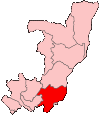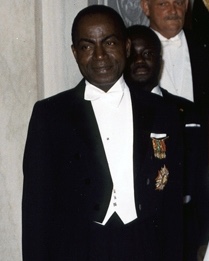Fulbert Youlou
Abbé Fulbert Youlou (19 July 1917 – 6 May 1972) was a laicized Brazzaville-Congolese Roman Catholic priest, nationalist leader and politician, who became the first President of the Republic of the Congo on its independence.
[1] Youlou disappointed many from the North when he imposed a single party system and imprisoned union leaders in August 1963; this led to the revolution of the "Trois Glorieuses."
[8] Here he met Barthélemy Boganda, the future nationalist leader of Oubangui-Chari and the first prime minister of the Central African Republic autonomous territory, but also Andre-Marie Mbida, Cameroon's first head of state.
Encouraged by his protector, Father Charles Lecomte, he offered his candidature for the African college in the territorial elections of 1947 in the district of Pool.
[18] Many Lari were followers of Matswanism, a messianic movement challenging colonialism which was founded by a Téké [André Matswa or Mutswé], who died in prison in 1942.
[17][20] In October 1955, thanks to this revolutionary image, a Kongo council (not limited to Lari people) chose Youlou as their representative for the upcoming legislative elections.
[23] The agitation reached fever pitch on 10 October 1956, the day of the election: when the polls of Bacongo were opened, Lari youth took it upon themselves to kill voters whom they suspected of not voting for Youlou.
[25] On 17 May 1956, Youlou founded the Union démocratique de défense des intérêts africains (UDDIA),[26] as a competitor to the Congolese Progressive Party (Parti progressiste congolais, PPC) of Tchicaya and of the section of the SFIO transformed in January 1957 into the African Socialist Movement (Mouvement socialiste africain, MSA) directed by Opangault.
[30] His political base, hitherto limited to the three regions of Pool, Niari and Bouenza, expanded to include Kouliou, with the assistance of the PPC secretary general, Stéphane Tchitchéllé.
French colonial officials, aware of Barthélemy Boganda's similar dramatic rise to power in Ubangi-Shari, did not want to take the risk of letting Youlou's request lapse, which could have caused unrest amongst the public, so they informed him of his error.
[32] The municipal elections took place on 18 November 1956 for a single combined European and African council and the UDDIA experienced clear success, taking Brazzaville, Pointe-Noire and Dolisie.
[37] During the territorial elections of March 1957, the leading colonists in the country united in the Union du Moyen-Congo (UMC) had effectively supported Youlou.
[43] In addition, after the departure of Jean-Félix Tchicaya from the Rassemblement Démocratique Africain (the pan-African party of Félix Houphouët-Boigny) the UDDIA replaced the PPC as its affiliate in the Congo.
[48] The opposition, headed by Opangault, denounced this action as a constitutional coup d'État and promised to transform Brazzaville into a war zone.
Opangault, whose party had only 20 seats, sought to redress the situation in the legislative elections scheduled for March 1959 by the agreement made with Youlou on 26 August 1958.
[53] These clashes rapidly consumed the whole of Brazzaville and transformed into a bloody battle between rival bands of Mbochi and Lari, which went beyond the simple rivalry between the MSA and the UDDIA.
[61] Delarue, a former official in the Prefecture of Police of Paris and a Vichy collaborator, had organised, to Abbé's advantage, the elimination of the Congolese far-left, which had regrouped as the Confédération générale africaine des travailleurs (CGTA) and the Union de la jeunesse congolaise (UJC).
[61] On 9 May 1960, on account of a fake "Communist plot", Youlou had the leaders of the CGTA and the UJC, Julien Boukambou and Aimé Matsika, arrested – along with his long-time opponent Simon Kikounga N'Got.
On 17 June 1959, after his legislative victory, contested by Opangault, he called for national unity: On 3 July, Youlou formed his second government, incorporating opposition politicians.
[81] To recover the financial situation, fiscal pressure rose from 17% of GDP in 1960 to 26% in 1963[80] while austerity measures were introduced in the administration: heads of civil service offices lost their official vehicles, travel expenses were no longer reimbursed, and advances were blocked.
[1] To make the government more representative of Congolese society, many ministerial appointments were made on the basis of regional origin rather than competence, creating problems for the country's development.
[82] It is reported that his wardrobe, which contained a full collection of cassocks in white, black, and red, was supplied by the famous fashion designer Christian Dior.
[85] The construction of a dam on this site would enable the production of 8 billion kilowatt hours of electricity per year and the development of heavy electro-metallurgic and chemical industry, offering significant employment.
[45] At the end of this conference, the "groupe de Brazzaville" was created, an anti-communist block which was the ancestor of the African and Malagasy Union (OCAM).
[45] In exchange for economic assistance with the planned Sounda dam, Youlou provided Tshombe with logistical support necessary for the separatist regime.
[45] Abbé took other controversial positions; although Angola was subject to violent colonial repression, he was the only leader to call for dialogue with the Portuguese dictator Salazar.
[45] In August 1962, Fulbert Youlou announced his intention to institutionalise this one-party state « afin de sceller la réconciliation et l'unité nationale réalisées » (in order to seal the reconciliation and national unity).
[115] Realising that Youlou's days were numbered, his successor as head of state, Alphonse Massamba-Débat, helped him to flee to Léopoldville on 25 March 1965.
[2] Yvonne de Gaulle, a fervent Catholic, did not like the eccentric priest,[2] who had continued to wear the cassock although defrocked[16] and who openly publicized his polygamy (he had no less than four official wives).
Shortly after taking the presidency, he denounced the Youlist plots which were orchestrated by captain Félix Mouzabakani (Youlou's nephew) and Bernard Kolelas in February and November 1969.







